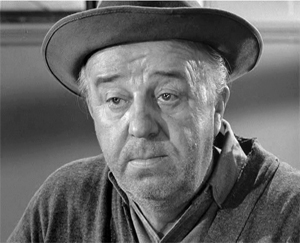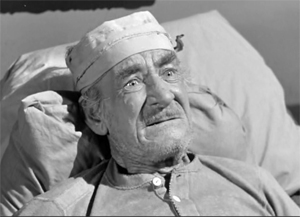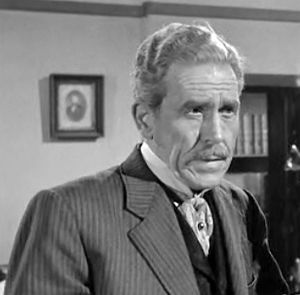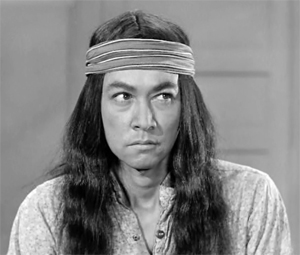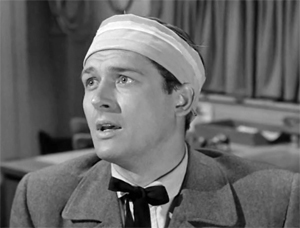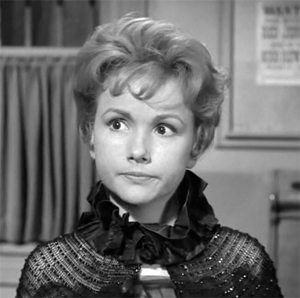Over its three-year run, Peter
Gunn's titular suave detective never failed to wrap up each week's mystery
in 25 minutes, but some 57 years after it left the airwaves, it still isn't
clear why the show was canceled. The Blake Edwards creation was a breakout hit
in its debut season, ranking 16th in the Nielsen ratings for the 1958-59 season
and garnering 8 Primetime Emmy nominations, one for the series itself, one for
each of the four principal actors, two for Edwards' writing and direction of
the pilot episode "The Kill," and one for Mancini's now iconic score.
When it failed to make the top 30 in its sophomore season, the series was
dropped by NBC but found new life when picked up by ABC for a third season in a
later time slot, away from the formidable competition of The Danny Thomas Show. It rebounded nicely into 29th place in the
ratings for 1960-61 and yet was not renewed for a fourth season, its spot on
ABC's schedule filled by the debut of Ben
Casey.
A search of 1961 issues of TV Guide reveals no news items about its cancellation. The February
11 cover story featured co-star Lola Albright, and even the September 16 Fall
Preview issue failed to include Gunn in
its list of programs "Going Off" in the new season. Even stranger,
the final episode of the series, "Murder on the Line," aired on
September 18 at the beginning of the fall season, nearly three months after the
previous episode, with the cryptic description that the episode "is a
departure from this series' summer rerun schedule" in its TV Guide listing. The description of the
episode being a departure is accurate, as it is the only episode to feature
extensive narration by Gunn in summarizing the action, and it features director
Robert Gist and executive producer Gordon Oliver in starring roles. Herschel
Bernardi is also notably absent, though he had not appeared in every previous
episode, but Lola Albright is present in her usual long-suffering girlfriend
role.
Certainly many of the principals were active with other
projects at the time. Albright married jazz pianist William Chadney, who also
played her on-screen accompanist Emmett Ward on Gunn, on May 20 in Las Vegas. Bernardi was active in the theater
circuit, as an April 29 TV Guide news
item reported that he was currently performing in a West Coast production of Only in America which he expected to
take on the road during the summer and was being considered for the lead role
in an upcoming Broadway production of Sizeman
and Son. And Edwards was in the midst of opening Breakfast at Tiffany's on October 5 and had just been chosen by
20th Century Fox to direct Days of Wine
and Roses, announced in the February 11 issue of TV Guide. However, if Edwards' exploding feature film career were going
to interfere with his TV work, he would not have also been promoting a new
series Boston Terrier mentioned
several times in TV Guide throughout
1961 and whose pilot finally aired as an episode on Dick Powell Theatre April 10, 1962, though it was not picked up for
a regular series. Edwards would also produce another unsuccessful TV pilot in
adapting the radio program Yours Truly,
Johnny Dollar in 1962, so it would seem that his schedule was not so
crammed that he could not have continued Gunn
had the network wanted to retain it. However, as the blog Television Obscurities has thoroughly
documented about another Edwards series cancellation, in this case Mr. Lucky, sometimes all it takes is a
bigger-name production company coveting your time slot to yank your show off
the air. Or perhaps the network executives were clairvoyant enough to see that
private detective series were in decline while doctor series were the next big
thing.
But even before the final curtain fell, the series seemed on
its last legs as the guest stars fell in stature and the plots seemed more
rote. Instead of a Ken Lynch, Diahann Carroll, George Kennedy, or James Coburn
guest starring, the 1961 episodes featured Al Ruscio, Tom Palmer, Bert Remsen,
and Jane Morgan. Even Herschel Bernardi's brother Jack shows up as a janitor in
"Death Is a Sore Loser" (January 30, 1961), which seemed to revive an
acting career that had been dormant for a decade. The stories are more uneven
as well, beginning with "The Royal Roust" (January 2, 1961) featuring
a visiting king who thinks American criminal justice practices are barbaric,
followed by "Bullet in Escrow" (January 9, 1961) in which a paroled
convict immediately and single-mindedly sets out to kill Gunn for sending him
to prison. Other plots are similarly simplistic, such as "Short a
Motive" (April 10, 1961) about a diminutive but lethal military veteran
who goes about knocking off anyone whoever made fun of his height during his
years in the service, or "Voodoo" (June 19, 1961) about a sugar cane
plantation owner in Haiti killing off small farmers whose land he covets by
infecting them a disease he has also used to kill off their cattle. There are
also plenty of faked deaths, such as in "The Murder Bond" (April 24,
1961) in which a mob boss about to face legal prosecution has his henchmen
round up a wino that they dress like their boss and then lure him to drive the
boss' bomb-laden car, or "Down the Drain" (June 26, 1961) in which a
husband and wife kill the man who discovered their jewel heist scam and
disfigure him so completely that the police have to rely on the wife's
recognizance to identify the victim, allowing her to claim it was her husband
who was killed. In the days before DNA testing, such hoaxes were apparently
plausible.
But there are a few noteworthy episodes as well, usually
easily identified by a superior supporting cast, such as "I Know It's
Murder" (February 13, 1961) in which a teenage son who claims to have
extrasensory perception is convinced that his mother's new husband is out to
kill her for her fortune. "Last Resort" (May 15, 1961) details an
overlooked associate film producer resorting to kidnapping to try to get enough
money to live in the manner he thinks he deserves instead of always being an
afterthought. And "A Bullet for the Boy" (May 29, 1961) tells the
story of the black sheep son of an American diplomat who someone seems intent
on murdering, only it turns out he is the one who wants to see himself killed.
These last two episodes are part of a four-episode sequence
all set in Acapulco, Mexico, another tactic of a flagging series hoping to spur
some interest by relocating to an exotic locale. While these episodes do
feature an additional recurring character, police Lt. Vasquez as played by
Peter Mamakos, and feature tangential links between them to explain Gunn's
extended stay south of the border, they don't really constitute a continuing
story arc, as each caper Gunn gets involved with is unrelated to its
predecessor. However, a more mundane explanation for this mini-series is that
these episodes provide a reason to leave Edie behind at the exact time that
Lola Albright was getting married and presumably taking a honeymoon. Other than
at the beginning of the first of the Acapulco series, "Till Death Do Us
Part" (May 8, 1961), Edie does not appear in any of the Mexico-based
episodes, but when Gunn returns stateside in "Death Is a Four Letter
Word" (June 5, 1961), Edie tells him that the difference between a man and
a woman is that he can just run off to someplace like Acapulco without anyone
giving it a second thought, whereas if she were to take off for Mexico City,
tongues would wag (it would be interesting to find out where Albright and Chadney
honeymooned--Mexico City?).
It's a shame that such a stylish and smart series fizzled
out without more fanfare. Edwards, obviously was bound for higher heights in
his feature film career, but he always had a special fondness for Gunn, as he
tried to resurrect the character in the 1967 feature film Gunn with Stevens in the title role but none of the rest of the
original cast. And in 1989 he made a TV movie with Peter Strauss in the title
role, but it failed to spur enough network interest to warrant a revival series
like Perry Mason. While Bernardi
would go on to win two Tony Awards on Broadway and eventually land his own
series in the 1970s, the careers of Stevens and Albright would never shine as
brightly. Still, judging from the reviews of the 2012 DVD release of Gunn, their best work has stood the test
of time and is winning new fans half a century later.
The Actors
For the biographies of Craig Stevens, Lola Albright,
Herschel Bernardi, and James Lanphier, see the 1960 post for Peter Gunn.
Billy Barty
Born William John Bertanzetti in Millsboro, Pennsylvania, his
family moved to California when Barty was a child after his father found work
as a machinist at Columbia Studios. Barty's entry into show business came when
director Jules White was shooting a scene near the Barty household in
Hollywood, and 3-year-old Barty walked up to White, tugged on his pants leg,
and performed a trick his father had taught him to spin on his head. Soon
thereafter he was playing Mickey Rooney's younger brother in a series of Mickey
McGuire shorts for the next 7 years. However, Barty's growth was stunted by cartilage-hair
hypoplasia dwarfism, and he reached a maximum height of less than four feet
when full grown. He was cast as children and babies in feature films such as Gold Diggers of 1933, Alice in Wonderland, and Bride of Frankenstein. In the 1930s he
also performed in his own vaudeville act called Billy Barty and His Sisters in
which he played drums and did impressions. In the 1940s he tried to leave show
business, attending college at what is now Cal State L.A. where he majored in
journalism and was sports editor for the college newspaper. But in the 1950s he
was lured back to television, first with one-off appearances on shows such as Your Pet Parade, The Dennis Day Show, and Mr.
and Mrs. North before becoming a regular member of Spike Jones' troupe and
appearing regularly on The Spike Jones
Show in 1954. After three appearances as Little Tom on Circus Boy and occasional spots on Alfred Hitchcock Presents, The
Colgate Comedy Hour (on which he did a parody of Liberace), and General Electric Theater, he landed a
semi-recurring role as hustler Babby on Peter
Gunn with a total of 8 appearances over the program's three seasons.
In 1957 he founded Little People of America to advocate on
behalf of those with dwarfism. In the mid-1960s he appeared in two Elvis
Presley features--Roustabout and Harum Scarum--and hosted his own
children's program in the Los Angeles area Billy
Barty's Big Show. He also continued getting TV guest spots on shows such as
My Three Sons, Rowan & Martin's Laugh-In, and Get Smart. In the 1970s he found regular work on children's
programs playing Googy Gopher and Orville Pelican on Pufnstuf, Sparky the Firefly on The
Bugaloos, Sigmund Ooze on Sigmund and
the Sea Monsters, and Hugo on Dr.
Shrinker. In 1981 he was awarded a star on the Hollywood Walk of Fame,
though it hardly signaled the end of his career as he remained active on
television and in feature films for another two decades. After being
hospitalized for heart problems and a lung infection in December 2000, he
passed away from heart failure on December 23 at the age of 76.
Notable Guest Stars
Season 3, Episode 14, "The Royal Roust": Leonard
Strong (appeared in Blood on the Sun,
Back to Bataan, The Atomic City, Shane,
and The Naked Jungle and played The
Claw on Get Smart) plays visiting
dignitary King Felix. Warren J. Kemmerling (Judge Rense on How the West Was Won) plays captured robber Bennett.
Season 3, Episode 15, "Bullet in Escrow": Leonard
Stone (shown on the left, appeared in The Mugger, The Big Mouth, Willy Wonka & the Chocolate Factory, and Soylent Green and played Doc Joslyn on Camp Runamuck, Packy Moore on General
Hospital, and Judge Paul Hansen on L.A.
Law) plays vengeful ex-con Ed Stone. Bob Hoy (Joe Butler on The High Chaparral and Cliff on Our House) plays his partner Ernie
Daggett. Clegg Hoyt (Mac on Dr. Kildare)
plays florist Aesop. Richard Collier (appeared in Hello, Dolly!, Blazing
Saddles, and Carrie and played
Harry Price on Many Happy Returns)
plays athletic club clerk Specs.
Season 3, Episode 16, "Jacoby's Vacation": Tom
Palmer (Doc Stewart on Lawman) plays tropical
gun runner Louis Frober. Oscar Beregi, Jr. (see the biography section for the
1961 post on The Untouchables) plays
his unnamed business partner. George Ives (Doc on Mister Roberts) plays brother of missing man Arthur Holland.
Season 3, Episode 17, "Blind Item": Irene Hervey (shown on the right, appeared
in Destry Rides Again, Cactus Flower, and Play Misty for Me and played Aunt Meg on Honey West) plays novelist's widow Madelon Ridgely. Richard Ney (appeared
in Mrs. Miniver, Joan of Arc, Ivy, and Midnight Lace) plays gossip columnist
Forest Graham. Mark Allen (Matt Kissel on The
Travels of Jamie McPheeters and Sam Evans on Dark Shadows) plays private investigator Edward Bellasco. Lloyd
Lindroth (harpist billed as "The Liberace of the Harp") plays harpist
Keith Tucker.
Season 3, Episode 18, "Death Is a Sore Loser": Jack
Bernardi (Herschel Bernardi's brother) plays apartment janitor Moishe Kalugian.
Joe di Reda (Angel Moran on General
Hospital) plays janitor Eddie Riley.
 Season 3, Episode 19, "I Know
It's Murder": Hayden Rorke (starred in Father's
Little Dividend, When Worlds Collide,
and Pillow Talk and played Steve on Mr. Adams and Eve, Col. Farnsworth on No Time for Sergeants, Dr. Alfred
Bellows on I Dream of Jeannie and
Bishop on Dr. Kildare) plays rug
importer Mark Eustis. Jean Engstrom (mother of Jena Engstrom) plays his wealthy
new bride Helene Daniels. Tommy Rettig (shown on the left, played Jeff Miller on Lassie and JoJo on Never Too
Young) plays her teenage son Kevin. Roy Gordon (Andrew V. McMahon on The Millionaire) plays their butler John.
Ken Drake (Bragan on Not for Hire)
plays bogus psychologist Dr. Jody.
Season 3, Episode 19, "I Know
It's Murder": Hayden Rorke (starred in Father's
Little Dividend, When Worlds Collide,
and Pillow Talk and played Steve on Mr. Adams and Eve, Col. Farnsworth on No Time for Sergeants, Dr. Alfred
Bellows on I Dream of Jeannie and
Bishop on Dr. Kildare) plays rug
importer Mark Eustis. Jean Engstrom (mother of Jena Engstrom) plays his wealthy
new bride Helene Daniels. Tommy Rettig (shown on the left, played Jeff Miller on Lassie and JoJo on Never Too
Young) plays her teenage son Kevin. Roy Gordon (Andrew V. McMahon on The Millionaire) plays their butler John.
Ken Drake (Bragan on Not for Hire)
plays bogus psychologist Dr. Jody.
Season 3, Episode 20, "A Kill and a Half": Bruce
Gordon (see the biography section for the 1961 post on The Untouchables) plays mobster Vic Kimbro. Norman Fell (shown on the right, see the
biography section for the 1961 post on 87thPrecinct) plays carnival owner Danny Carmichael. Virginia Vincent (Betty on
The Joey Bishop Show, Dottie Clark on
The Super, and Daisy Maxwell on Eight Is Enough) plays his wife Dora.
Season 3, Episode 21, "Than a Serpent's Tooth": Pamela
Britton (shown on the left, starred in A Letter for Evie,
D.O.A., and If It's Tuesday, This Must Be Belgium and played Blondie Bumstead
on Blondie and Mrs. Lorelei Brown on My Favorite Martian) plays nightclub
singer Vicki Landell. Anne Whitfield (Barbara Harris on Days of Our Lives) plays her step-daughter Carol. Jean Paul King (NBC
network radio announcer in the 1930s) plays psychiatrist Dr. Lawrence Herzog.
Joseph Julian (Vic Kirby on Somerset)
plays ex-con Arkie.
Season 3, Episode 22, "The Deep End": William
Bryant (McCall on Combat!, President
Ulysses S. Grant on Branded, Col.
Crook on Hondo, Lt. Shilton on Switch, and the Director on The Fall Guy) plays swimming instructor
Phil Matterson. John Fiedler (shown on the right, appeared in 12
Angry Men, That Touch of Mink, The World of Henry Orient, Kiss Me, Stupid, Girl Happy, The Odd Couple, True
Grit and played Emil Peterson on The
Bob Newhart Show and Woody on Buffalo
Bill) plays aspiring composer Oliver Neilson.
Season 3, Episode 23, "Portrait in Leather": Tom
Brown (shown on the left, see the biography section for the 1960 post on Mr. Lucky) plays boxing manager Charlie Toomey. Ann Robinson (starred
in The War of the Worlds, Dragnet, and Midnight Movie Massacre and played Queen Juliandra on Rocky Jones, Space Ranger and Helen
Watkins on Fury) plays former boxing
champion's ex-wife Joanna Cochrane. Roy Glenn (Roy on The Jack Benny Program) plays trainer Otis Calder. William Fawcett
(Clayton on Duffy's Tavern, Marshal
George Higgins on The Adventures of Rin
Tin Tin, and Pete Wilkey on Fury)
plays pickpocket Sobey Webb.
Season 3, Episode 24, "Come Dance With Me and Die":
Barbara Stuart (shown on the right, played Bessie on The Great
Gildersleeve, Alice on Pete and
Gladys, Bunny on Gomer Pyle, U.S.M.C.,
Peggy Ferguson on The McLean Stevenson
Show, Marianne Danzig on Our Family
Honor, and Alice on Huff) plays dance
hostess Candy Lane. Larry J. Blake (the unnamed jailer on Yancy Derringer and Tom Parnell on Saints and Sinners) plays the dance club manager. Harry Swoger (Harry
the bartender on The Big Valley)
plays taxi driver Eddie Webb. Robert P.Lieb (Harry Thompson on Hazel) plays mobster Frank Benedict. Jack
Hogan (starred in The Bonnie Parker Story,
Paratroop Command, and The Cat Burglar and played Kirby on Combat!, Sgt. Jerry Miller on Adam-12, Chief Ranger Jack Moore on Sierra, and Judge Smithwood on Jake and the Fatman) plays private
investigator William Lundy.
Season 3, Episode 25, "Cry Love, Cry Murder": Margarita
Cordova (Rosa Andrade on Santa Barbara
and Carmen Torres on Sunset Beach) plays
cantina singer Maria Galvin. Joe Besser (shown on the left, replaced Shemp Howard as the third of
The Three Stooges and played Stinky Davis on The Abbott and Costello Show, Mr. Jillson on The Joey Bishop Show, and voiced Babu on Jeannie and Scare Bear on Yogi's
Space Race) plays theatrical agent Chubby Stone. Dale van Sickel (Clancy on
Commando Cody: Sky Marshal of the
Universe) plays drug dealer Frankie Cole. Mickey Simpson (Boley on Captain David Grief) plays hired muscle
Max Willard.
Season 3, Episode 26, "A Penny Saved": Joyce
Vanderveen (shown on the right, played Marie de Gravien on The
Adventures of Jim Bowie) plays ballet dancer Lisa North. Lillian Adams
(appeared in The Jerk, Private Benjamin, and Bruce Almighty and played Mrs. Pepperman
on The Suite Life on Deck) plays her
mother Mrs. North. Abraham Sofaer (starred in Christopher Columbus, Quo
Vadis, and Elephant Walk) plays producer
Boris Petrov. Paul Dubov (Michel on The
Ann Sothern Show) plays mobster Frank Wallace. Marcel Hillaire (appeared in
Sabrina, Seven Thieves, and Murderer's
Row and played Inspector Bouchard on Adventures
in Paradise) plays former ballet director Jacque. Joe Scott (see the
biography section for the 1960 post on Mr. Lucky) plays a sanitarium attendant.
Season 3, Episode 27, "Short a Motive": Jo Helton
(Nurse Conant on Dr. Kildare) plays restaurant
owner Ellen Clary. Paul Brinegar (shown on the left, see the biography section for the 1960 post
on Rawhide) plays film projectionist
Chigger. Frank Gerstle (Dirk Gird on The Life and Legend of Wyatt Earp and voiced Raseem on The Banana Splits Adventure Hour) plays racketeer Frank Clanton.
 Season 3, Episode 28, "The Murder Bond": Russell
Collins (shown on the right, appeared in Niagara, Bad Day at Black Rock, and Fail-Safe and played Owen Sharp on Many Happy Returns) plays bail bondsman
Ned Grant. Jean Willes (appeared in Invasion
of the Body Snatchers, Ocean's 11,
and Gypsy) plays racketeer's wife
Mrs. Cully. Owen Bush (Ben on Shane,
John Belson on Sirota's Court, and
Crimshaw on Our House) plays former
Cully stooge Nibs. Howard Caine (Schaab on The
Californians and Maj. Wolfgang Hochstetter on Hogan's Heroes) plays investigator Al Landers.
Season 3, Episode 28, "The Murder Bond": Russell
Collins (shown on the right, appeared in Niagara, Bad Day at Black Rock, and Fail-Safe and played Owen Sharp on Many Happy Returns) plays bail bondsman
Ned Grant. Jean Willes (appeared in Invasion
of the Body Snatchers, Ocean's 11,
and Gypsy) plays racketeer's wife
Mrs. Cully. Owen Bush (Ben on Shane,
John Belson on Sirota's Court, and
Crimshaw on Our House) plays former
Cully stooge Nibs. Howard Caine (Schaab on The
Californians and Maj. Wolfgang Hochstetter on Hogan's Heroes) plays investigator Al Landers.
Season 3, Episode 29, "The Most Deadly Angel": Harold
J. Stone (John Kennedy on The Grand Jury,
Hamilton Greeley on My World and Welcome
to It, and Sam Steinberg on Bridget
Loves Bernie) plays crime patriarch Joseph Yabocci. Mary Sinclair (Sylvia
Rockwell on Woman With a Past) plays avenging
angel Caroline Haskins.
Season 3, Episode 30, "Till Death Do Us Part": William
Phipps (shown on the left, see the biography section for the 1960 post on The Life and Legend of Wyatt Earp) plays Acapulco crime boss Johnny
Burnett. Anne Bellamy (Aunt Polly on The
New Adventures of Huckleberry Finn) plays supposedly murdered wife Leona
Candell. Peter Mamakos (Jean Lafitte on The
Adventures of Jim Bowie) plays Acapulco police Lt. Vasquez.
Season 3, Episode 31, "Last Resort": Ross Elliott
(Freddie the director on The Jack Benny Program
and Sheriff Abbott on The Virginian)
plays talent agent Ned Koenig. Francis X. Bushman (shown on the right, starred in Romeo and Juliet (1916), Ben-Hur: A Tale of the Christ, Dick Tracy (1937), Sabrina, and The Phantom
Planet) plays former film star Clinton Hobart. Randy Stuart (see the
biography section for the 1960 post on The Life and Legend of Wyatt Earp) plays his wife Doris. Sherwood Price (Gen.
Jeb Stuart on The Gray Ghost) plays
hot-shot young director Les Murdock. Milton Selzer (Parker on Get Smart, Jake Winkelman on The Harvey Korman Show, Abe Werkfinder
on The Famous Teddy Z, and Manny
Henry on Valley of the Dolls) plays
associate producer Lou Warren. Peter Mamakos (see "Till Death Do Us
Part" above) returns as Lt. Vasquez.
Season 3, Episode 32, "A Matter of Policy": Bert
Remsen (shown on the left, played Detective Lawrence on Peyton Place,
Mr. Pell on Gibbsville, Mario on It's a Living, and Jack Crager on Dynasty) plays wanted killer Fred Dineen.
Natividad Vacio (Fronk on Father Knows Best) plays bomb-maker Maldonado. Peter Mamakos (see "Till Death Do Us
Part" above) returns as Lt. Vasquez.
 Season 3, Episode 33, "A Bullet for the Boy": John
Eldredge (starred in The Woman in Red,
The Murder of Dr. Harrigan, and The Black Cat and played Harry Archer on
Meet Corliss Archer) plays American
diplomat Victor Mitchell. Linda Watkins (shown on the right, played Robin Crosley on One Life to Live) plays his wife Laura. Michael Pate (starred in Face to Face, Julius Caesar, Hondo, and
Tower of London and played Chief
Vittoro on Hondo and Det. Sgt. Vic
Maddern on Matlock) plays fisherman
Juan Mendoza. Peter Mamakos (see "Till Death Do Us
Part" above) returns as Lt. Vasquez.
Season 3, Episode 33, "A Bullet for the Boy": John
Eldredge (starred in The Woman in Red,
The Murder of Dr. Harrigan, and The Black Cat and played Harry Archer on
Meet Corliss Archer) plays American
diplomat Victor Mitchell. Linda Watkins (shown on the right, played Robin Crosley on One Life to Live) plays his wife Laura. Michael Pate (starred in Face to Face, Julius Caesar, Hondo, and
Tower of London and played Chief
Vittoro on Hondo and Det. Sgt. Vic
Maddern on Matlock) plays fisherman
Juan Mendoza. Peter Mamakos (see "Till Death Do Us
Part" above) returns as Lt. Vasquez.
Season 3, Episode 34, "Death Is a Four Letter Word":
J. Pat O'Malley (shown on the left, see the biography section for the 1961 post on Frontier Circus) plays Gunn's drinking
friend Luther. Virginia Grey (appeared in Uncle
Tom's Cabin, The Women, Another Thin Man, Mr. and Mrs. North, and Stage
Door Canteen and played Clara Appleby on The Red Skelton Hour) plays former model Lisa Randolph. Patric
Knowles (starred in The Adventures of
Robin Hood, How Green Was My Valley,
and The Wolf Man) plays financier
Virgil Considine. Ned Glass (MSgt. Andy Pendleton on The Phil Silvers Show, Sol Cooper on Julia, and Uncle Moe Plotnick on Bridget Loves Bernie) plays hot-dog stand owner Natie. Edwin Mills
(voice of Dr. Cornelius on Return to the
Planet of the Apes) plays a police doctor.
Season 3, Episode 35, "Deadly Intrusion": Britt
Lomond (Captain Monastario on Zorro
and Johnny Ringo on The Life and Legend of Wyatt Earp) plays golf pro Gil Manson. Francis de Sales (shown on the right, played Lt. Bill
Weigand on Mr. & Mrs. North,
Ralph Dobson on The Adventures of Ozzie & Harriet, Sheriff Maddox on Two
Faces West, and Rusty Lincoln on Days
of Our Lives) plays gambler Johnny Wade. Joseph Mell (Bill Pence on Gunsmoke) plays garage owner Janos
Majeski. Norma Michaels (Grandmother on Mind
of Mencia and Josephine on The King
of Queens) plays a waitress.
Season 3, Episode 36, "Voodoo": Al Ruscio (Paul
Locatelli on Shannon, Sal Giordano on
Life Goes On, Frank Ruscio on Joe's Life, and Kosta Kanelos on Port Charles) plays Haitian police
Inspector Georges.
Season 3, Episode 37, "Down the Drain": Jane
Morgan (shown on the left, popular singer married to producer Jerry Weintraub) plays supposed
widow Lois Lee. Dale van Sickel (see "Cry Love, Cry Murder" above)
plays her supposedly dead husband William. Burt Mustin (see the biography
section for the 1961 post on Leave It to Beaver) plays a boatyard watchman.
Season 3, Episode 38, "Murder on the Line": Robert
Gist (director for Peter Gunn) plays eccentric
millionaire Cesar Carlyle. Gordon Oliver (executive producer for Mr. Lucky and Peter Gunn) plays his assistant Arthur McCutchen.






















